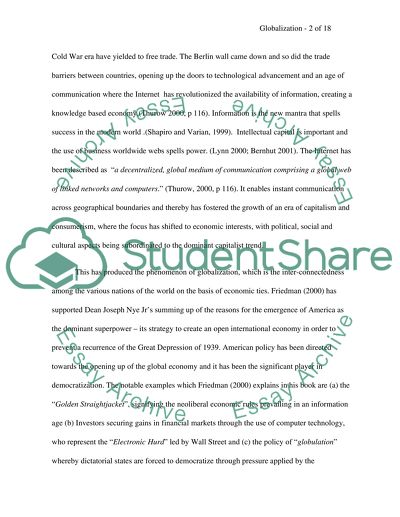Cite this document
(“Globalization inevitably leads to a homogenous 'world' culture and the Essay”, n.d.)
Globalization inevitably leads to a homogenous 'world' culture and the Essay. Retrieved from https://studentshare.org/miscellaneous/1537006-globalization-inevitably-leads-to-a-homogenous-world-culture-and-the-erasure-of-local-richness-discuss-using-a-variety-of-examples-from-your-research-into-cu
Globalization inevitably leads to a homogenous 'world' culture and the Essay. Retrieved from https://studentshare.org/miscellaneous/1537006-globalization-inevitably-leads-to-a-homogenous-world-culture-and-the-erasure-of-local-richness-discuss-using-a-variety-of-examples-from-your-research-into-cu
(Globalization Inevitably Leads to a Homogenous 'world' Culture and the Essay)
Globalization Inevitably Leads to a Homogenous 'world' Culture and the Essay. https://studentshare.org/miscellaneous/1537006-globalization-inevitably-leads-to-a-homogenous-world-culture-and-the-erasure-of-local-richness-discuss-using-a-variety-of-examples-from-your-research-into-cu.
Globalization Inevitably Leads to a Homogenous 'world' Culture and the Essay. https://studentshare.org/miscellaneous/1537006-globalization-inevitably-leads-to-a-homogenous-world-culture-and-the-erasure-of-local-richness-discuss-using-a-variety-of-examples-from-your-research-into-cu.
“Globalization Inevitably Leads to a Homogenous 'world' Culture and the Essay”, n.d. https://studentshare.org/miscellaneous/1537006-globalization-inevitably-leads-to-a-homogenous-world-culture-and-the-erasure-of-local-richness-discuss-using-a-variety-of-examples-from-your-research-into-cu.


